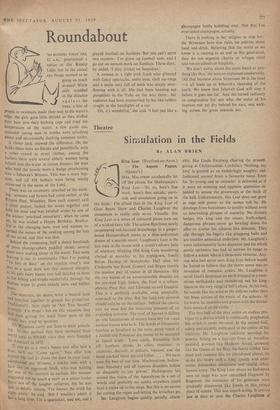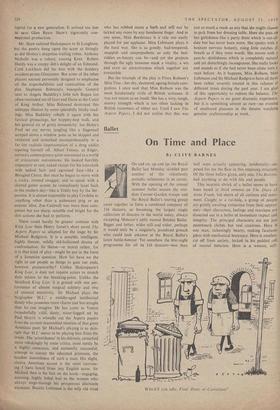Theatre
Simulation in the Fields
By ALAN BRIEN King Lear. (Stratford-on-Avon.) — The Aspern Papers. (Queen's,)
Mats. MALAPROP accidentally hit off the phrase for Shakespeare's King Lear—'So, so, here's fine work, here's fine suicide, parri- cide and simulation going on in the fields.' I'm afraid that in the King Lear of Glen Byam Shaw and Charles Laughton the simulation is really only so-so. Visually, this King Lear is a series of coloured plates torn out of a wicked-fairy tale. The action flips from newly carpentered oak-beamed Stonehenge to a ginger- bread Humperdinck mews to a blue-and-cream dream of a seaside resort. Laughton'S Lear is the lost man in the moon with a comet's silvery halo of whiskers, blinking Old King Cole wandering abroad at noonday in his nightgown, lonely Baron Hardup of Stonybroke Flail after his Cinderella has flown. Goneril and Regan (surely the nastiest pair of names in all literature--like the two halves of an unmentionable disease) are the sex-mad Ugly Sisters, the Fool is a schizo- phrenic Peter Pan, and Edmund an evil Dandini. This is a perfectly workable. even admirable. approach to the play. But the fairy-tale pictures should only be on the surface: behind the cosmic cuts we must feel the mounting pressure or an exploding universe. The roof of heaven is falling in—the foundations of society have dry'rot--and no man knows who he is. The words of Gloucester (spoken at Stratford in the testy. prosy tones of a foolish old Polonius) are meant to be accepted as literal truth : 'Love cools, friendship falls off, brothers divide. In cities, mutinies; in countries, discord; in palaces, treason; and the bond cracked 'twixt son and father.. . . We 'have seen the best of our time. Machinations, hollow- ness, treachery and all ruinous disorders follow us disquietly to our graves.' Shakespeare has snared this vision of the Apocalypse in a net of words and probably no actors anywhere could haul it entire on to the stage. But this is no excuse for cutting the ropes and letting the leviathan go.
Mr. Laughton begins quietly, jovially, charit-
ably, like Uncle Fezziwig chairing the present- giving at Christmastide. Cordelia's 'Nothing, my lord' is greeted as an endearingly naughty, old- fashioned answer from a favourite niece. Even his `So young and so untender' is delivered as if it were an amusing and apposite quotation in- tended to amuse the grown-ups at the back of the hall. Unfortunately, this Lear does not grow in rage and power as the scenes roll by. He develops from boyishness to senility without even an intervening glimpse of maturity. No divinity hedges this king and the massy, knife-edged, dangerous phrases never go bowling down the alley to scatter his subjects like ninepins. They slip through his fingers like pingpong balls and are trodden unnoticed underfoot. Mr. Laughton's voice unfortunately lacks diapason and the whole poetic orchestra has had to narrow its range to follow a soloist who is a three-note virtuoso. Any- one who had never seen King Lear before would be forced to believe that the storm scene was an invention of romantic critics. Mr. Laughton is 'never God's lieutenant on earth trapped in a mon- strous earthquake and thundering out his king- liness on the very verge of hell's abyss. At his best, he sounds like the wind in the willows rather than the brass section of the music of the spheres. At his worst, he mumbles and groans with the thread- bare moan of an old violin.
The first half of the play seems an endless pro- logue to a drama which is continually prophesied but which is never revealed. In the second half, safely and securely enthroned at the centre of his madness, Mr. Laughton suddenly unveiled his powers. Sitting on a hay-cart from an Arcadian pastoral, gowned like Madame Arcati,. crowned like the Queen of the May, his heavy rubber face dead and cratered like an abandoned planet, he spoke his 'every, inch a king' speech with enor-
mous, defenceless tenderness and restful, affec- tionate irony. The King Lear whom we had never seen on stage was now unearthed fragment by fragment, the remnants of his greatness were gradually discovered like fossils in this ,ruined piece of nature. This was superb acting. It arrived just in time to save the Charles Laughton of
legend for a new generation. It arrived too late to save Glen Byam Shaw's vigorously con- ventional production.
Mr. Shaw tailored Shakespeare to fit Laughton, but the poetry hung upon the actor as fittingly as did Motley's shapeless trailing robes. Anthony Nicholls was a robust, rousing Kent. Robert Hardy was a creepy deb's delight of an Edmund. Cyril Luckham did his best with the doddery accident-prone Gloucester. But some of the other players seemed perversely designed to emphasise all the improbabilities and comicalities of the plot. Stephanie Bidmead's beanpole Goneril next to Angela Baddeley's little tich Regan too often reminded me of Gert and Daisy at the Court of King Arthur. Miss Bidmead destroyed this unhappy illusion by some splendidly bitchy read- ings. Miss Baddeley rebuilt it again with her farcical grimacings, her hoppity-hop walk, and her general air of grisly domesticity. Ian Holm's Fool set my nerves jangling like a fingernail scraped down a window pane as he skipped and twittered and screeched incomprehensibly in a far too realistic impersonation of a drug addict tapering himself off. Albert Finney, as Edgar, seemed a contemporary actor marooned in a world of aristocratic conventions. He looked horribly impressive at rest, naked except for his loin-cloth with spiked hair and agonised face—like a Breughel Christ. But once he began to move with a cocky, twisted swagger, and to speak with a slurred gutter accent, he immediately leapt back to the modern day—like a Teddy boy by the Ser- pentine. It is almost impossible to play Cordelia as anything other than a pubescent prig or an anaemic idiot. Zoe Caldwell was more than com- petent but too sharp, sensible and bright for the dim actions she had to perform.
There could hardly be greater contrast with King Lear thin Henry James's short novel The Aspen' Papers as adapted for the stage by Sir Michael Redgrave. It is a sensible, intelligent, highly literate, mildly old-fashioned drama of confrontation. Its theme—or moral rather, for it is that kind of play—might be put in the form of a Jamesian question. How far have we the , right to use people as things to gain our ends, however praiseworthy? Unlike Shakespeare's King Lear, it does not require actors to stretch their talents to the breaking-point. Unlike the Stratford King Lear, it is graced with one per- formance of almost magical subtlety and two of unusual sensitivity. Sir Michael plays the biographer `H.J.,' a middle-aged intellectual dandy who possesses more charm and less scruple than he can imagine. He has come to Venice (wonderfully solid, dusty, water-logged set by Paul Mayo) ,o wheedle out the Aspern papers from the ancient mummified mistress of that great American poet. Sir Michael's playing is so skin- tight that 'N.J.' seems to be playing him from the inside. The `actorishness' in his delivery, remarked upon rebukingly by some critics, must surely be a highly conscious, and eminently successful, attempt to convey the educated primness, the boudoir donnishness of such a man. His slight, elusive American accent is the most convinc- ing I have heard from any English actor. Sir Michael then is the bait on the hook—engaging, amusing, highly lethal bait to the women who always stage-manage his prosperous dilettante existence. Beatrix Lehmann is the wily old trout who has robbed many a barb and will not be tickled any more by any handsome finger. And in one sense, Miss Bordereau is a role too easily played for pat applause. Miss Lehmann plays it the hard way. She is as greedy, bad-tempered, snappish and unsympathetic as only the bed- ridden ex-beauty can be—and yet she projects through the ugly tiresome mask a vitality, a wit, and even an attractiveness which together are irresistible.
But the triumph of the play is Flora Robson's Miss Tina—her shy, shuttered, ageing female com- panion. I once said that Miss Robson was the most handsomely virile of British actresses. It was not meant as an insult. She has a wiry, tough, sinewy strength which is too often lacking in British mummers of either sex. Until I saw The Aspern Papers, I did not realise that this was just as much a mask as any that she might choose to pick from her dressing table. Here she puts on her girlishness like a party dress which is out-of- date but has never been worn. She speaks with a hesitant nervous honesty, using little catches of breath as if they were words. She moves with a gauche skittishness which is completely natural and yet disturbingly incongruous. She really looks and sounds as if she had never been alone with a man before. As it happens, Miss Robson, Miss Lehmann and Sir Michael Redgrave have all three been rather severely treated in this column at different times during the past year. 1 am glad of this opportunity to redress the balance. The Aspern Papers is no great dramatic experience, but it is something almost as rare—an evening of unalloyed pleasure in the theatre watching genuine craftsmanship at work.



































 Previous page
Previous page